Understanding Complexity in Managing Projects: Theories and Tools
VerifiedAdded on 2023/06/06
|5
|1077
|361
Essay
AI Summary
This essay delves into the complexities of project management, exploring how the complexity theory, a blend of chaotic theory, information theory, and cognitive psychology, aids in understanding and managing unpredictable project outcomes. It identifies human behavior as a primary cause of project complexity, emphasizing the importance of effective leadership and team management. The essay also discusses how both internal and external environments influence project complexity, highlighting the need for team unity and competitive awareness. Furthermore, it suggests using tools like PMI’s Talent Triangle for personal improvement and strategic business management, dividing projects into smaller, manageable parts, and creating a project complexity model to analyze risks and plan solutions, ultimately enabling project managers to handle complex projects more efficiently. Desklib provides students access to similar solved assignments and study resources.
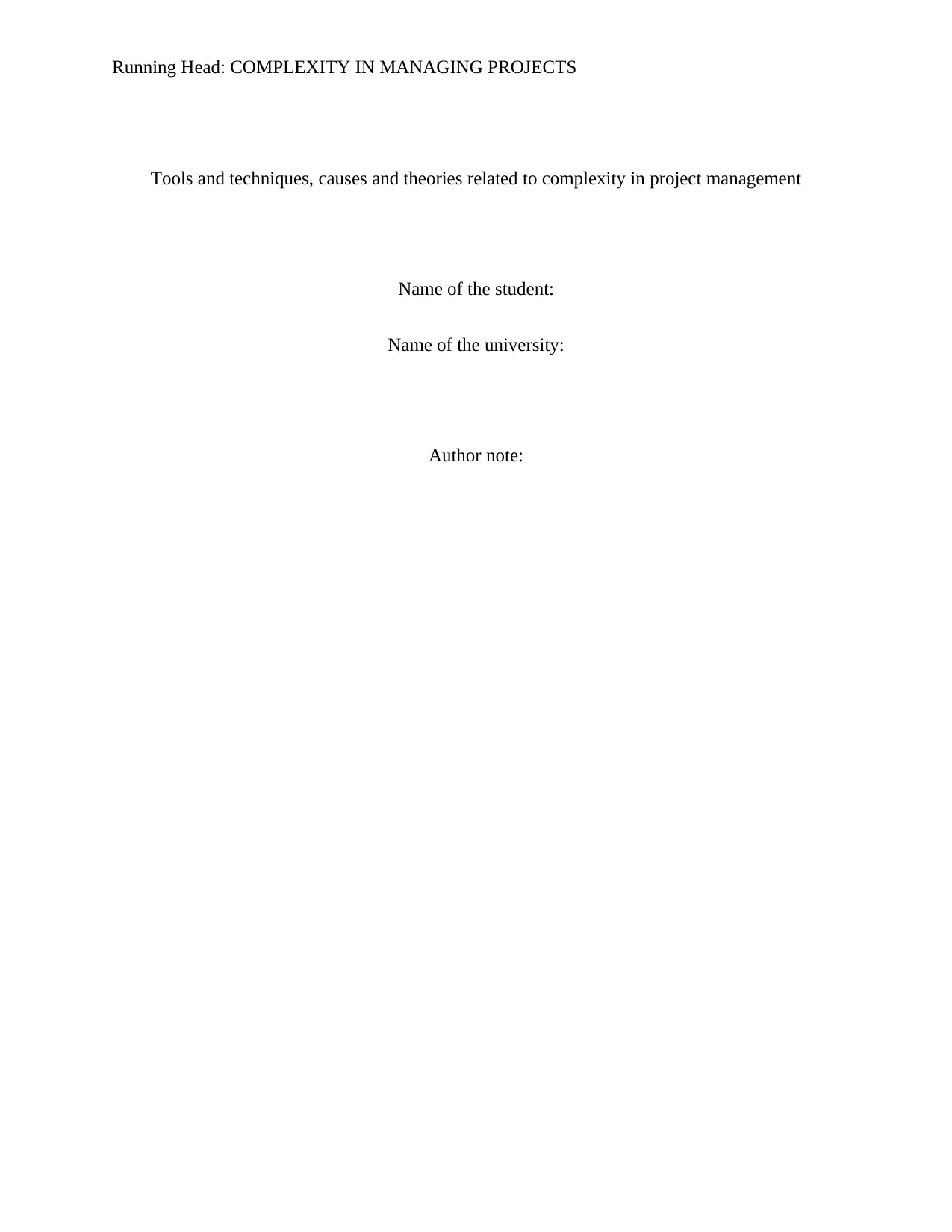
Running Head: COMPLEXITY IN MANAGING PROJECTS
Tools and techniques, causes and theories related to complexity in project management
Name of the student:
Name of the university:
Author note:
Tools and techniques, causes and theories related to complexity in project management
Name of the student:
Name of the university:
Author note:
Paraphrase This Document
Need a fresh take? Get an instant paraphrase of this document with our AI Paraphraser
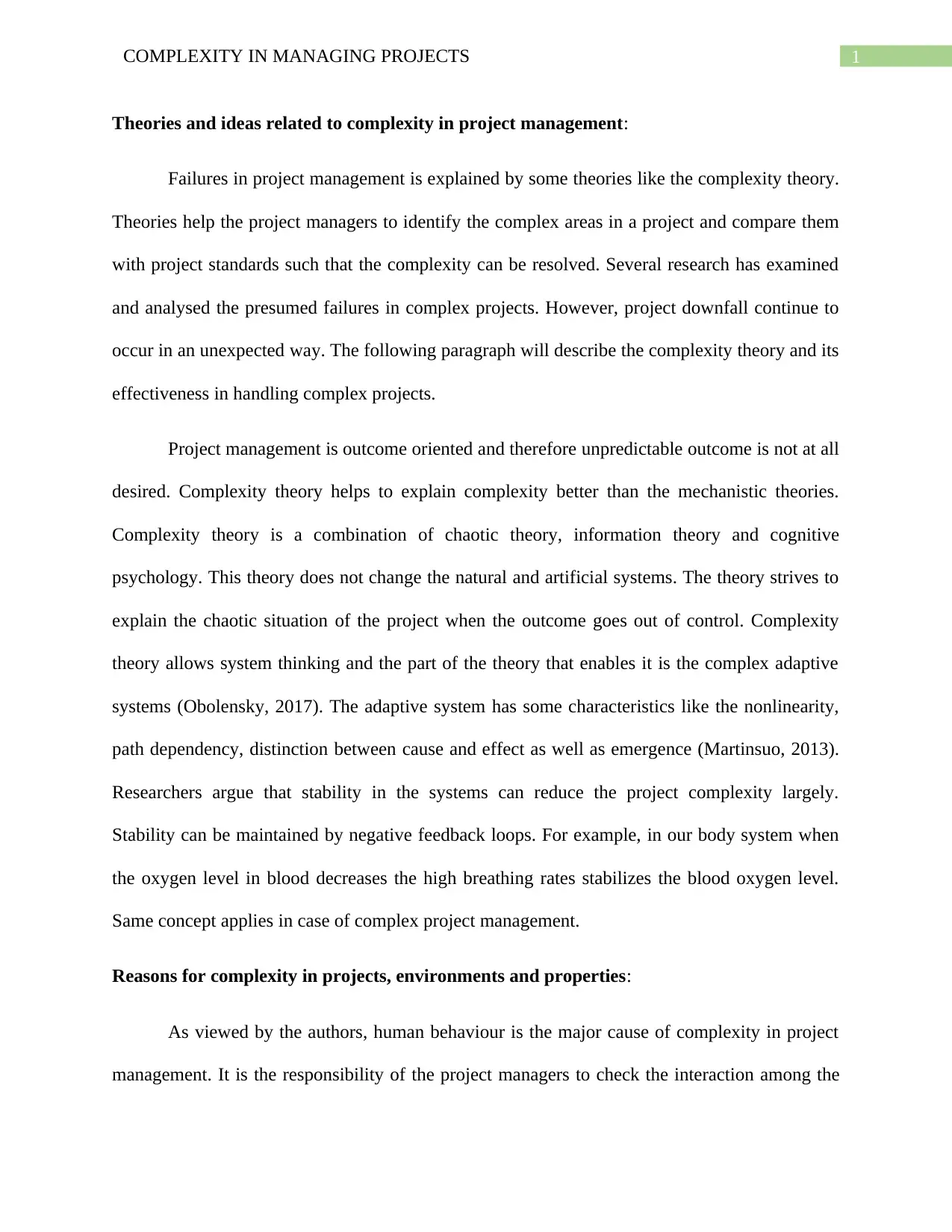
1COMPLEXITY IN MANAGING PROJECTS
Theories and ideas related to complexity in project management:
Failures in project management is explained by some theories like the complexity theory.
Theories help the project managers to identify the complex areas in a project and compare them
with project standards such that the complexity can be resolved. Several research has examined
and analysed the presumed failures in complex projects. However, project downfall continue to
occur in an unexpected way. The following paragraph will describe the complexity theory and its
effectiveness in handling complex projects.
Project management is outcome oriented and therefore unpredictable outcome is not at all
desired. Complexity theory helps to explain complexity better than the mechanistic theories.
Complexity theory is a combination of chaotic theory, information theory and cognitive
psychology. This theory does not change the natural and artificial systems. The theory strives to
explain the chaotic situation of the project when the outcome goes out of control. Complexity
theory allows system thinking and the part of the theory that enables it is the complex adaptive
systems (Obolensky, 2017). The adaptive system has some characteristics like the nonlinearity,
path dependency, distinction between cause and effect as well as emergence (Martinsuo, 2013).
Researchers argue that stability in the systems can reduce the project complexity largely.
Stability can be maintained by negative feedback loops. For example, in our body system when
the oxygen level in blood decreases the high breathing rates stabilizes the blood oxygen level.
Same concept applies in case of complex project management.
Reasons for complexity in projects, environments and properties:
As viewed by the authors, human behaviour is the major cause of complexity in project
management. It is the responsibility of the project managers to check the interaction among the
Theories and ideas related to complexity in project management:
Failures in project management is explained by some theories like the complexity theory.
Theories help the project managers to identify the complex areas in a project and compare them
with project standards such that the complexity can be resolved. Several research has examined
and analysed the presumed failures in complex projects. However, project downfall continue to
occur in an unexpected way. The following paragraph will describe the complexity theory and its
effectiveness in handling complex projects.
Project management is outcome oriented and therefore unpredictable outcome is not at all
desired. Complexity theory helps to explain complexity better than the mechanistic theories.
Complexity theory is a combination of chaotic theory, information theory and cognitive
psychology. This theory does not change the natural and artificial systems. The theory strives to
explain the chaotic situation of the project when the outcome goes out of control. Complexity
theory allows system thinking and the part of the theory that enables it is the complex adaptive
systems (Obolensky, 2017). The adaptive system has some characteristics like the nonlinearity,
path dependency, distinction between cause and effect as well as emergence (Martinsuo, 2013).
Researchers argue that stability in the systems can reduce the project complexity largely.
Stability can be maintained by negative feedback loops. For example, in our body system when
the oxygen level in blood decreases the high breathing rates stabilizes the blood oxygen level.
Same concept applies in case of complex project management.
Reasons for complexity in projects, environments and properties:
As viewed by the authors, human behaviour is the major cause of complexity in project
management. It is the responsibility of the project managers to check the interaction among the
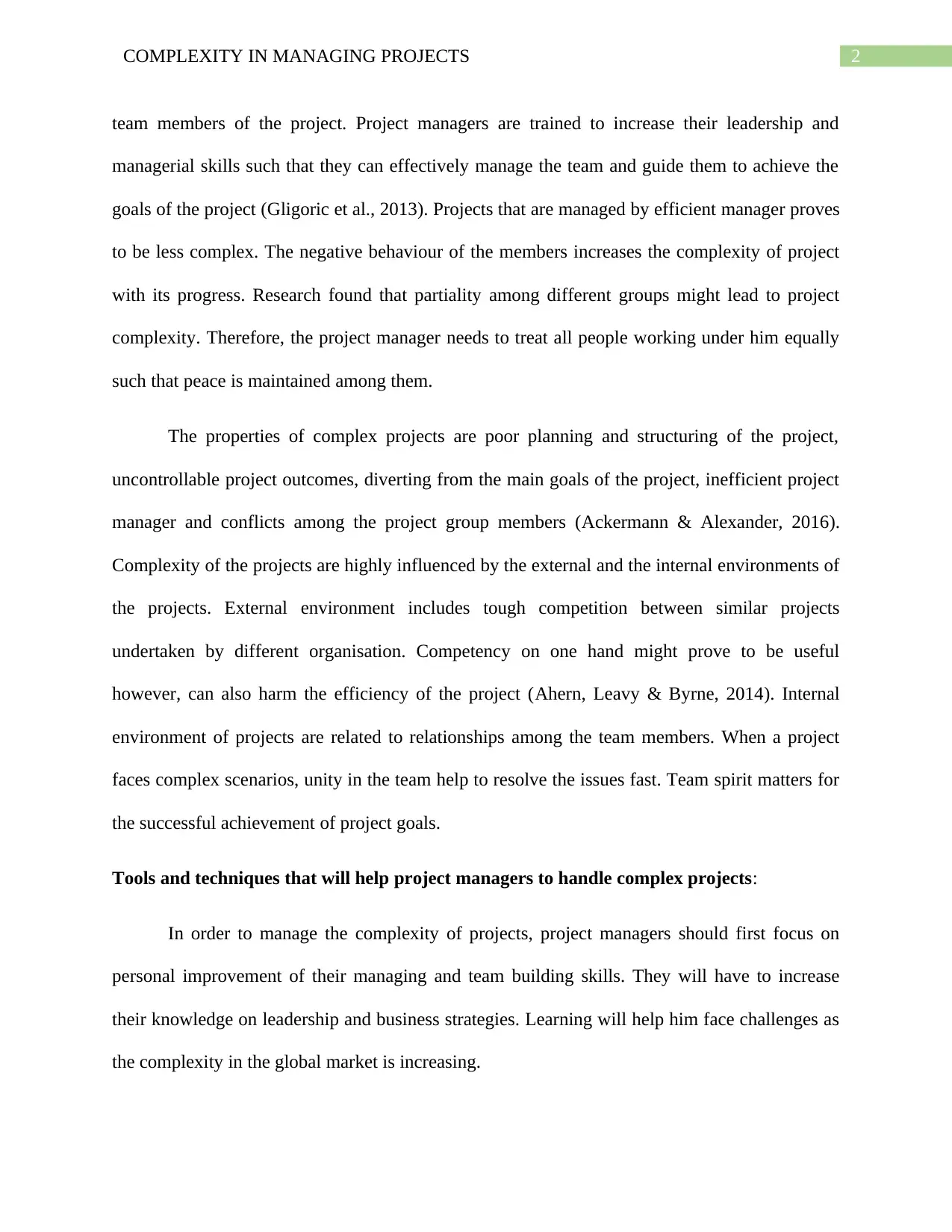
2COMPLEXITY IN MANAGING PROJECTS
team members of the project. Project managers are trained to increase their leadership and
managerial skills such that they can effectively manage the team and guide them to achieve the
goals of the project (Gligoric et al., 2013). Projects that are managed by efficient manager proves
to be less complex. The negative behaviour of the members increases the complexity of project
with its progress. Research found that partiality among different groups might lead to project
complexity. Therefore, the project manager needs to treat all people working under him equally
such that peace is maintained among them.
The properties of complex projects are poor planning and structuring of the project,
uncontrollable project outcomes, diverting from the main goals of the project, inefficient project
manager and conflicts among the project group members (Ackermann & Alexander, 2016).
Complexity of the projects are highly influenced by the external and the internal environments of
the projects. External environment includes tough competition between similar projects
undertaken by different organisation. Competency on one hand might prove to be useful
however, can also harm the efficiency of the project (Ahern, Leavy & Byrne, 2014). Internal
environment of projects are related to relationships among the team members. When a project
faces complex scenarios, unity in the team help to resolve the issues fast. Team spirit matters for
the successful achievement of project goals.
Tools and techniques that will help project managers to handle complex projects:
In order to manage the complexity of projects, project managers should first focus on
personal improvement of their managing and team building skills. They will have to increase
their knowledge on leadership and business strategies. Learning will help him face challenges as
the complexity in the global market is increasing.
team members of the project. Project managers are trained to increase their leadership and
managerial skills such that they can effectively manage the team and guide them to achieve the
goals of the project (Gligoric et al., 2013). Projects that are managed by efficient manager proves
to be less complex. The negative behaviour of the members increases the complexity of project
with its progress. Research found that partiality among different groups might lead to project
complexity. Therefore, the project manager needs to treat all people working under him equally
such that peace is maintained among them.
The properties of complex projects are poor planning and structuring of the project,
uncontrollable project outcomes, diverting from the main goals of the project, inefficient project
manager and conflicts among the project group members (Ackermann & Alexander, 2016).
Complexity of the projects are highly influenced by the external and the internal environments of
the projects. External environment includes tough competition between similar projects
undertaken by different organisation. Competency on one hand might prove to be useful
however, can also harm the efficiency of the project (Ahern, Leavy & Byrne, 2014). Internal
environment of projects are related to relationships among the team members. When a project
faces complex scenarios, unity in the team help to resolve the issues fast. Team spirit matters for
the successful achievement of project goals.
Tools and techniques that will help project managers to handle complex projects:
In order to manage the complexity of projects, project managers should first focus on
personal improvement of their managing and team building skills. They will have to increase
their knowledge on leadership and business strategies. Learning will help him face challenges as
the complexity in the global market is increasing.
⊘ This is a preview!⊘
Do you want full access?
Subscribe today to unlock all pages.

Trusted by 1+ million students worldwide
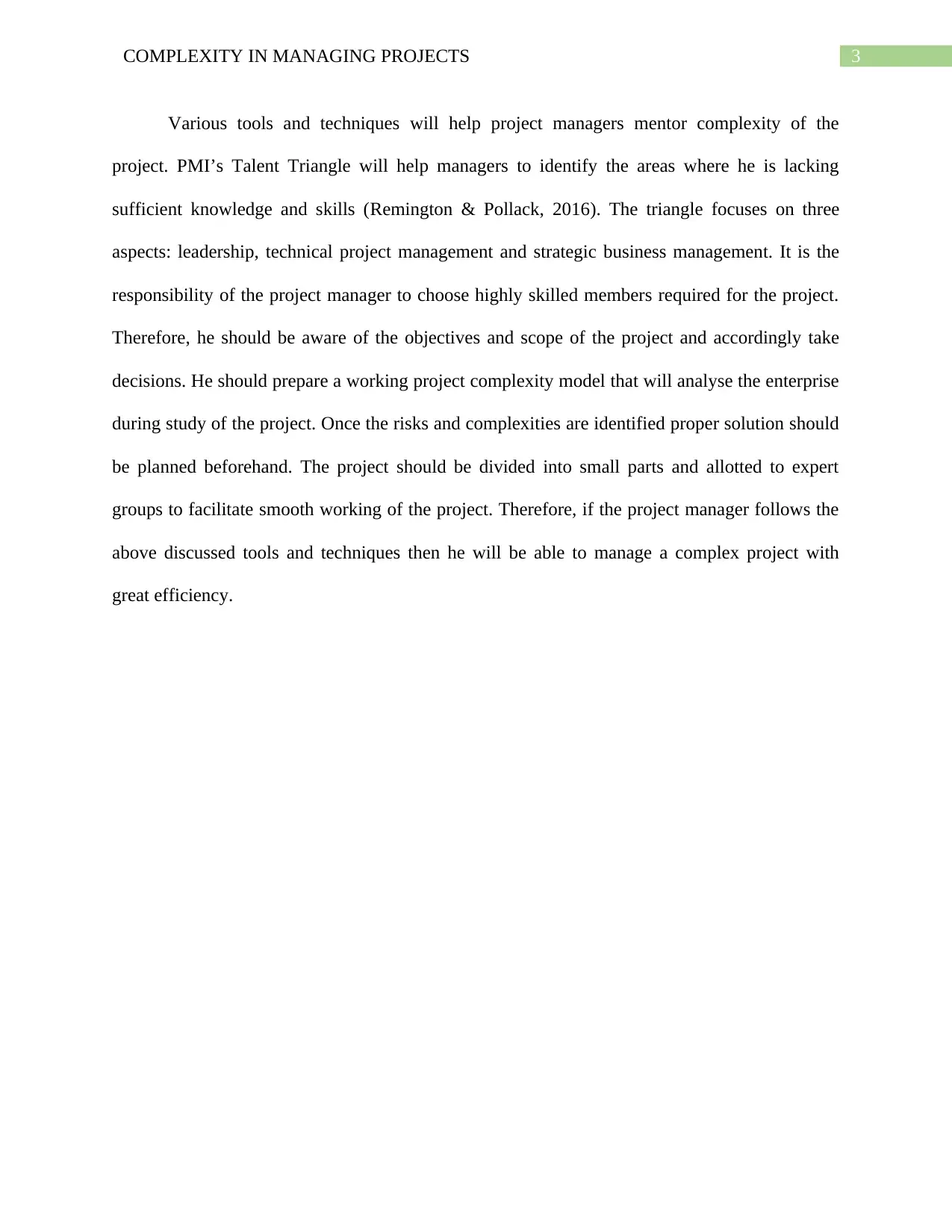
3COMPLEXITY IN MANAGING PROJECTS
Various tools and techniques will help project managers mentor complexity of the
project. PMI’s Talent Triangle will help managers to identify the areas where he is lacking
sufficient knowledge and skills (Remington & Pollack, 2016). The triangle focuses on three
aspects: leadership, technical project management and strategic business management. It is the
responsibility of the project manager to choose highly skilled members required for the project.
Therefore, he should be aware of the objectives and scope of the project and accordingly take
decisions. He should prepare a working project complexity model that will analyse the enterprise
during study of the project. Once the risks and complexities are identified proper solution should
be planned beforehand. The project should be divided into small parts and allotted to expert
groups to facilitate smooth working of the project. Therefore, if the project manager follows the
above discussed tools and techniques then he will be able to manage a complex project with
great efficiency.
Various tools and techniques will help project managers mentor complexity of the
project. PMI’s Talent Triangle will help managers to identify the areas where he is lacking
sufficient knowledge and skills (Remington & Pollack, 2016). The triangle focuses on three
aspects: leadership, technical project management and strategic business management. It is the
responsibility of the project manager to choose highly skilled members required for the project.
Therefore, he should be aware of the objectives and scope of the project and accordingly take
decisions. He should prepare a working project complexity model that will analyse the enterprise
during study of the project. Once the risks and complexities are identified proper solution should
be planned beforehand. The project should be divided into small parts and allotted to expert
groups to facilitate smooth working of the project. Therefore, if the project manager follows the
above discussed tools and techniques then he will be able to manage a complex project with
great efficiency.
Paraphrase This Document
Need a fresh take? Get an instant paraphrase of this document with our AI Paraphraser
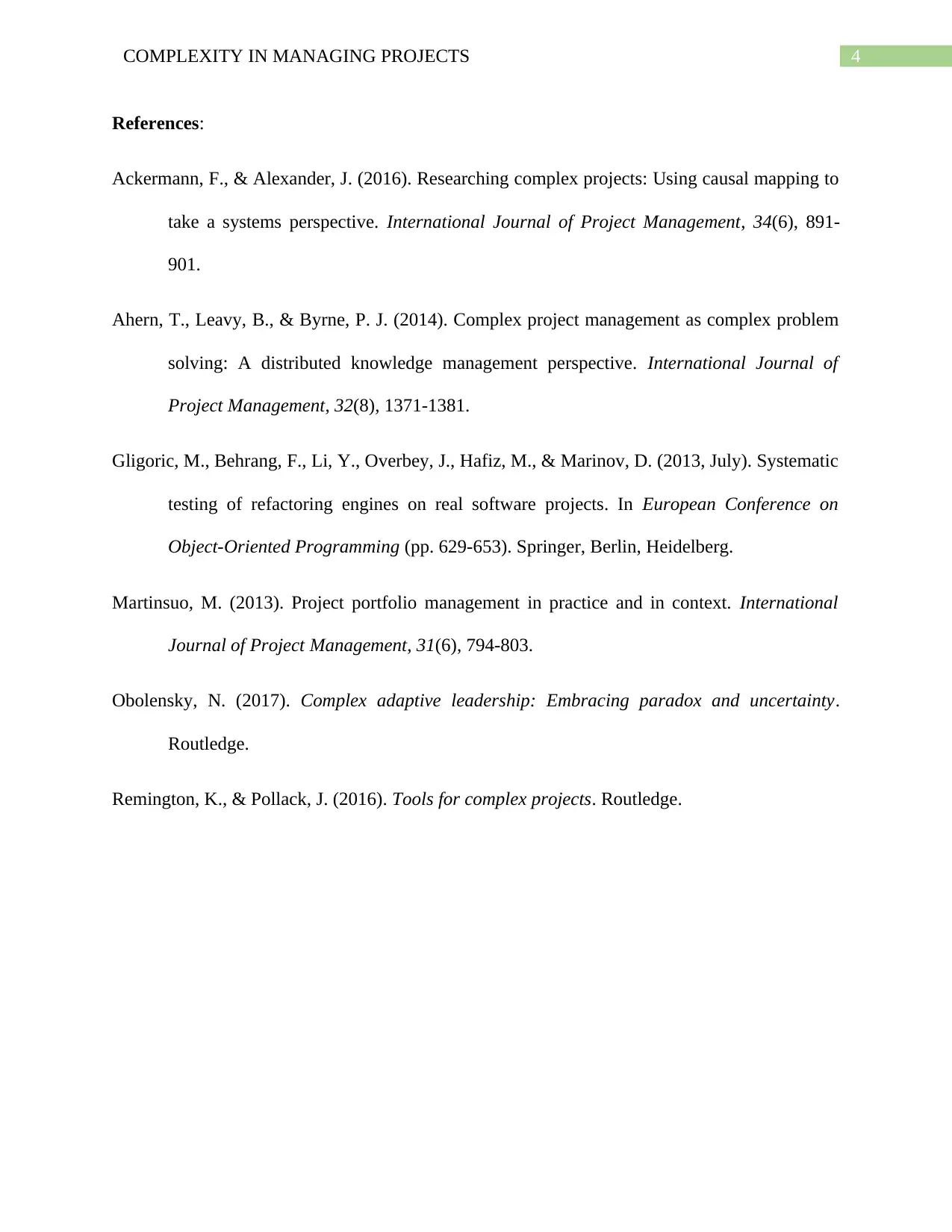
4COMPLEXITY IN MANAGING PROJECTS
References:
Ackermann, F., & Alexander, J. (2016). Researching complex projects: Using causal mapping to
take a systems perspective. International Journal of Project Management, 34(6), 891-
901.
Ahern, T., Leavy, B., & Byrne, P. J. (2014). Complex project management as complex problem
solving: A distributed knowledge management perspective. International Journal of
Project Management, 32(8), 1371-1381.
Gligoric, M., Behrang, F., Li, Y., Overbey, J., Hafiz, M., & Marinov, D. (2013, July). Systematic
testing of refactoring engines on real software projects. In European Conference on
Object-Oriented Programming (pp. 629-653). Springer, Berlin, Heidelberg.
Martinsuo, M. (2013). Project portfolio management in practice and in context. International
Journal of Project Management, 31(6), 794-803.
Obolensky, N. (2017). Complex adaptive leadership: Embracing paradox and uncertainty.
Routledge.
Remington, K., & Pollack, J. (2016). Tools for complex projects. Routledge.
References:
Ackermann, F., & Alexander, J. (2016). Researching complex projects: Using causal mapping to
take a systems perspective. International Journal of Project Management, 34(6), 891-
901.
Ahern, T., Leavy, B., & Byrne, P. J. (2014). Complex project management as complex problem
solving: A distributed knowledge management perspective. International Journal of
Project Management, 32(8), 1371-1381.
Gligoric, M., Behrang, F., Li, Y., Overbey, J., Hafiz, M., & Marinov, D. (2013, July). Systematic
testing of refactoring engines on real software projects. In European Conference on
Object-Oriented Programming (pp. 629-653). Springer, Berlin, Heidelberg.
Martinsuo, M. (2013). Project portfolio management in practice and in context. International
Journal of Project Management, 31(6), 794-803.
Obolensky, N. (2017). Complex adaptive leadership: Embracing paradox and uncertainty.
Routledge.
Remington, K., & Pollack, J. (2016). Tools for complex projects. Routledge.
1 out of 5
Related Documents
Your All-in-One AI-Powered Toolkit for Academic Success.
+13062052269
info@desklib.com
Available 24*7 on WhatsApp / Email
![[object Object]](/_next/static/media/star-bottom.7253800d.svg)
Unlock your academic potential
Copyright © 2020–2026 A2Z Services. All Rights Reserved. Developed and managed by ZUCOL.


